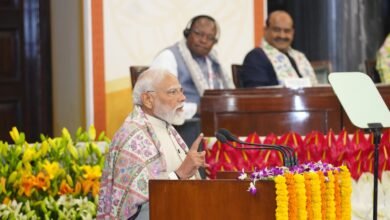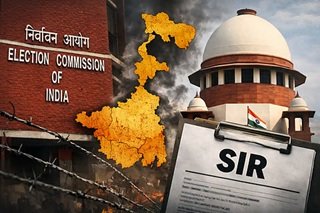No woman can act as surrogate mother by providing her own gametes
Binay Gupta-New Delhi
Center Clarifies The Surrogacy Law Provision Before Supreme Court That Surrogate Mother Need Not Be Genetically Related To Child.
Noting that the child to be born through surrogacy must be genetically related to the intending couple or intending woman (widow or divorcee), the Centre has told the Supreme Court that the Surrogacy Act does not permit a surrogate mother to provide her own gametes (ova or egg cells).
On February 6, the Supreme Court issued a directive ordering the center to immediately implement the three significant clarifications the union government issued in relation to the current surrogacy and assisted reproductive technologies regime after consulting with the National Assisted Reproductive Technology and Surrogacy Board.
A group of petitions and interim applications contesting various provisions of the Surrogacy (Regulation) Act, the Assisted Reproductive Technology (Regulation) Rules, the Assisted Reproductive Technology (Regulation) Act, and other laws were being heard by a division bench of Justices Ajay Rastogi and Bela M. Trivedi.
What are the clarifications the center has made?
Children must be genetically related to either the intended lady or both intended parents (widow or divorcee)
The first concern was with the phrase genetically related as used in Section 2(1)(zg) of the Surrogacy Act. The term surrogate mother is defined in this paragraph as a woman who consents to bear a child (who is genetically linked to the intending couple or intending woman) through surrogacy from the implantation of the embryo in her womb and as such, satisfies the requirements established in the act. The center has stated that the child and not the surrogate mother were considered to be genetically connected.
In other words, the kid to be born through surrogacy must be genetically connected to the intended couple or intended woman, even though the surrogate mother may not be. Since unmarried women are not included in the scope of the act, the function of a third-party sperm donor would only apply to intended women who are widowed or divorced and choose to have a child through surrogacy.
Strongly objecting to this, attorney Mohini Priya argued that the ART Act’s provisions—which did not forbid the use of third-party donor eggs—were incompatible with the requirement that surrogate children, in the case of an intending couple and the intending woman, be genetically related to both parents.
All states and UTs must establish ART and surrogacy boards; Bihar, UP, and Gujarat have not yet complied.
The center has also made it clear that all states and union territories must establish a state-level ART and surrogacy board in accordance with Sections 6 of the ART Act and Section 26 of the Surrogacy Act. Aside from Bihar, Uttar Pradesh, and Gujarat, such expert committees have currently been established in all states and union territories, according to Bhati, who also briefed the court.
All states and UTs must establish the necessary authorities, although Bihar and UP have not yet done so.
The center has also stated that for the purposes of the two laws, Section 12 of the ART Act and Section 35 of the Surrogacy Act required the establishment of suitable authorities in all states and union territories. Currently, all states and union territories—aside from Bihar and Uttar Pradesh—have established such authorities, according to Bhati.
Background
The Supreme Court had in September 2022 issued notice to the Centre and the Indian Council of Medical Research (ICMR) on a petition filed by Arun Muthuvel challenging the validity of the Surrogacy (Regulation) Act, 2021, the Assisted Reproductive Technology (Regulation) Act, 2021 and the Rules framed under the two laws.
The petitioner contended that the provisions of the two Acts directly infringed upon the right to privacy; went against the reproductive rights of women; and fell short in fully addressing the essential goal of regulating surrogacy and other assisted reproductive techniques.
“The Surrogacy Act imposes a blanket ban on commercial surrogacy, which is neither desirable nor may be effective,” the petitioner said, adding the ban on commercial surrogacy, seemingly implemented to protect “impoverished women”, denudes surrogates of their right over their bodies and denies them the opportunity to exercise agency over their right to give birth.
In addition to pointing out various inconsistencies in the two acts being challenged, the lead petition, which was submitted by an infertility specialist from Chennai named Dr. Arun Muthuvel through the attorneys Mohini Priya and Ameyavikrama Thanvi, also noted that the twin legislation established a legal regime that was discriminatory and violated the constitutional rights to privacy and autonomy in reproductive matters.
The petition claimed that the contested actions deny agency and autonomy in the discourse on reproductive justice through its discriminatory, exclusive, and arbitrary nature, and establish a state-sanctioned notion of the ideal family that restricts reproductive rights.
Following the top court’s decision in September to hear the case challenging the two acts, numerous other petitions and applications were submitted raising analogous and related issues, such as whether it was constitutional to exclude unmarried women from the Surrogacy Act’s application or whether limiting an oocyte donor’s number of donations under the ART Act would constitute unscientific and irrational restrictions.
News Mania Desk






